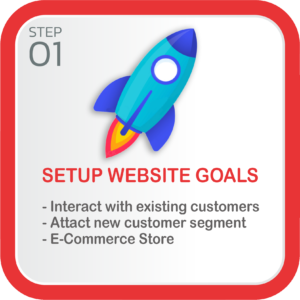Set Website Goals
Website Goals

Starting a small business website involves careful consideration of key goals to ensure a successful online presence. These goals play a crucial role in establishing the business, attracting customers, and fostering growth. Here are some key website goals for a small business:
Online Visibility and Branding
Establishing a strong online presence is essential for small businesses. The website should reflect the brand identity, including the logo, color scheme, and overall design. Consistent branding helps in creating a memorable and recognizable image.
Customer Acquisition
The primary goal of any business website is to attract and acquire customers. The site should be optimized for search engines (SEO) to increase visibility and drive organic traffic. It’s important to have a clear call-to-action (CTA) to guide visitors toward making a purchase, subscribing, or contacting the business.
User-Friendly Experience
A user-friendly website is key to keeping visitors engaged. Easy navigation, clear and concise content, and a responsive design contribute to a positive user experience. Mobile optimization is also crucial, considering the growing number of users accessing websites on smartphones and tablets.
Informative Content
Providing valuable and relevant information through blog posts, product/service descriptions, and FAQs establishes the business as an authority in its industry. This not only attracts potential customers but also builds trust and credibility.
E-commerce Functionality (if applicable)
For businesses selling products, integrating e-commerce functionality is crucial. The website should have a secure and easy-to-use shopping cart system, clear product descriptions, and a streamlined checkout process.
Lead Generation
Collecting leads is vital for ongoing communication and marketing efforts. Implementing lead generation forms, offering incentives for newsletter sign-ups, and utilizing opt-in mechanisms can help in building a database of potential customers.
Social Media Integration
Leveraging social media platforms is essential for expanding the business’s online reach. Integrating social media buttons, sharing options, and embedding feeds can enhance brand visibility and encourage user interaction.
Analytics and Measurement
Implementing analytics tools allows the business to track website performance, user behavior, and conversion rates. Regularly analyzing this data helps in making informed decisions, refining strategies, and optimizing the website for better results.
Security and Trust
Ensuring the security of customer information is paramount. Implementing SSL certificates, securing payment gateways, and displaying trust badges can instill confidence in visitors, assuring them that their data is safe.
Scalability and Future Growth
The website should be designed with scalability in mind. As the business grows, the website should be able to accommodate increased traffic, additional features, and evolving business needs.
By aligning the website with these key goals, a small business can establish a robust online presence, attract customers, and lay the foundation for long-term success.

